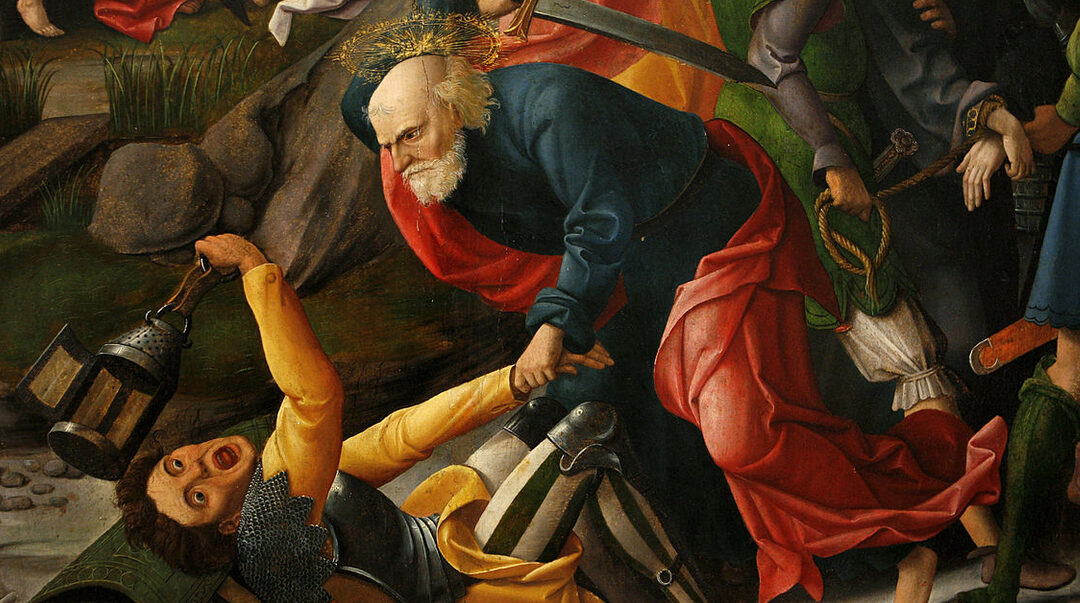“Then they took him, and led him, and brought him into the high priest’s house. And Peter followed afar off,” (Luke 22:54).
We should never be surprised when God doesn’t work the way we think he should in a situation. He never has. And that’s because, as Isaiah 55:8 tells us, God’s ways are not our ways. A prime example occurs in the Garden of Gethsemane the night the soldiers came to arrest Christ. Man’s way of dealing with the situation is demonstrated by Peter, who drew his sword and swung at one of the soldiers, cutting off his ear. God’s way of working his plan through this situation was for Christ to willingly surrender to the arrest without a fight. Christ, therefore, will not strike, lest he lose the victory. Christ did not come to fight, but to conquer, and his weapon is not the sword, but the cross.
But what is even more amazing about this particular occurrence is that the entire band of soldiers, at least according to Scripture, appear to be unfazed at the miracles that occurred right before their eyes that night. First of all, in plain view to all who were there, Jesus picked up Malchus’ ear off the ground that Peter cut off with his sword and restored it to its place, as if it had never been severed. The second miracle occurred when Jesus simply responded, “I am he whom you seek,” and every last soldier in unison fell backward to the ground without any external force causing them to do so.
How could they see such a cure and such a phenomenon of force without believing the omnipotence of Christ’s tongue and hand that worked these miracles? How could they see that with a mere few words he could knock them all down and not consider that they were in the presence of God, the Lion of the Tribe of Judah? How could they observe that hand that restored a severed ear with nothing more than a touch and not realize they were about to arrest one much greater than themselves?
And yet this was not an uncommon response of some who saw Christ’s miracles with their own eyes, in particular, those religious leaders who were present when Jesus raised Lazarus from the dead (John 11:44). Immediately after observing this miraculous event, they assembled a council and concluded that “if we let him alone, everyone will believe in him.” It may have certainly seemed so to them simply because they were afraid of losing their power over the people.
But God alone holds the key to the heart. And the truth is that if God locks up the heart, it is not within man’s power to open it (John 12:40). The secrets of the Lord are known only to those he chooses to reveal himself to. He shows his ways to the meek who seek him and to those who fear him. In short, men remain blind to the truth unless God himself opens their eyes of faith. Only then do we see the miracle of Christ and his Gospel and those wondrous things he makes available to us through his law, his mercy, and his grace.
Contemplations:
- Lord, you have said, “he that will lose his life for my sake shall save it,” (Matt. 16:25) because you, O Lord, restore it by the touch of your grace. I want to pursue you to the point where I lose myself to you. Help me, therefore, make your Word a lamp to my feet and a light to my path (Ps. 119:105) that I may see you more clearly and follow you more devotedly.
- You, Lord, bestowed your mercies and your miracles on Malchus, one who came to lay violent hands on you. Why should I think, therefore, that I can be so sinful that you cannot be much more merciful if I repent of my sin? Your finger is able to remove all of my sins into that sea of your blood, for “your hand is not shortened that it cannot save, nor is your ear heavy that it will not hear,” (Isa. 59:1). How much rather, then, will your hand bind up my broken heart (Ps. 51)? It does not lie in the sin, but in the sinner, to shut out your unrelenting mercy. It is his impenitence in the sin, not your impatience at it, that excludes your mercy.
- I will strive to imitate you, Lord, but not in the face of your majesty, nor in terms of your wisdom, nor in regard to your power, but rather in the beauty of your mercy. This is the virtue in which I cannot press too near you. I will not strive too much, to imitate you, either in the face of your majesty, with Lucifer, or brains of wisdom with Adam, (Genesis 3), or arm in power with Nebuchadnezzar, but in the depths of your mercy, those let me not spare to put on, (Luke 6:36). Help me to be merciful, as you my heavenly Father are merciful. Your mercy has no excess.
Further References for Luke 22:54 as it pertains to Christ’s conquest as the Lion:
Rev. 22:16; Heb. 7:14; Gen. 49:9; Rom. 15:12; Isa. 11:1


